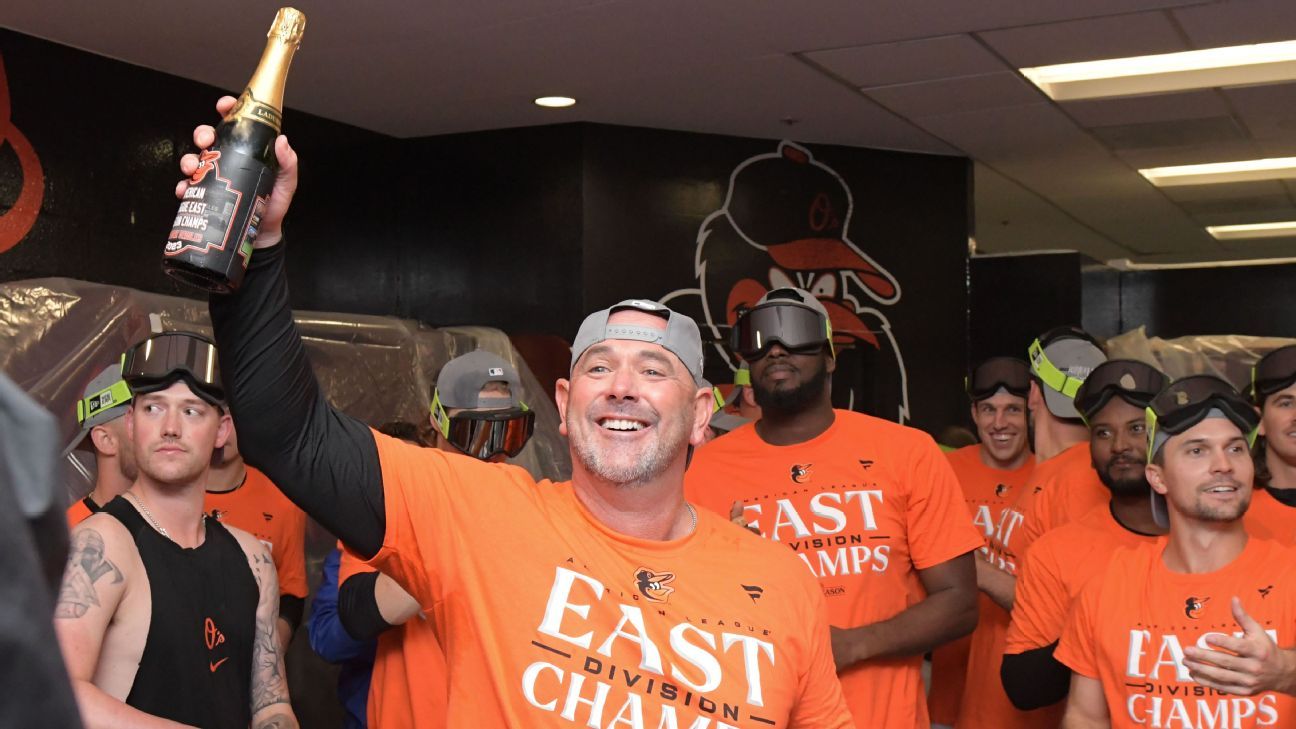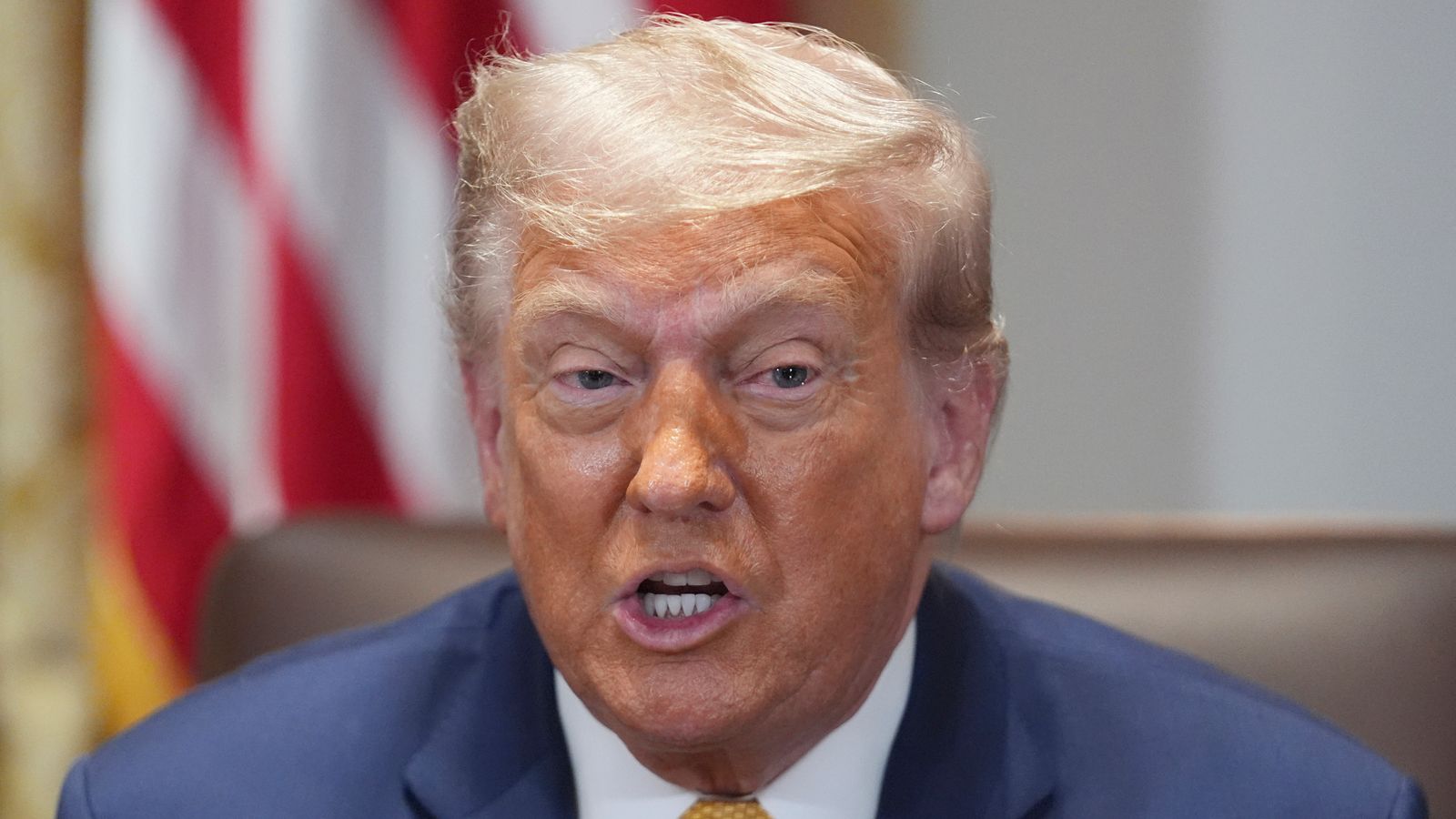American League Manager of the Year
Greg Fiume/Getty Images
Winner: Brandon Hyde, Baltimore Orioles
Final tally: Hyde 144 (27 first-place votes); Bruce Bochy, Rangers 61 (3); Kevin Cash, Rays 52; Rocco Baldelli, Twins 8; Dusty Baker, Astros 4; John Schneider, Blue Jays 1
Experts’ picks: Hyde (9 votes), Bochy (4)
Doolittle’s take: Anyone paying attention knew the Orioles were a franchise poised to bust out — but few thought they’d do so in a 100-plus win fashion, let alone this year, just two seasons removed from a 110-loss season. With the laid back Hyde setting the tone, the Baby Birds won more game than any Baltimore team since the days of Earl Weaver, Jim Palmer and Eddie Murray. The O’s added 18 wins to their 2022 win total (83) — which was in itself a major surprise.
While the manager awards are the hardest to contextualize with metrics at the individual level, Hyde stood out in all the areas that tend to attract observers to managerial excellence. Baltimore outperformed its run profile by 7.2 wins, second-largest positive gap in the majors. The Orioles beat their preseason over-under consensus by 23.5 wins, making them easily the most surprising team in baseball. And they went 30-16 in one-run games.
Beyond that, the Orioles were just fun, as Hyde and his staff continue to transition some of the game’s most promising young players into the big-league level. Who will forget the “Homer Hose ” which was totally not at all exactly like a fraternity party beer bong?
Some managers are hired ostensibly to be a rebuild skipper, to hold down the fort as the losses pile up and the team builds its roster to contention worthiness. Often, those beleaguered managers are fired in favor of a big-name skipper as soon as the team starts contending. Anything can happen, of course, but it sure looks like Hyde and the Orioles are a fit poised for a long run together.
Hyde becomes the fourth Oriole to win AL Manager of the Year honors, joining Frank Robinson (1989), Davey Johnson (1997) and Buck Showalter (2014). Bochy finished a distant second, so he’ll have to be content with his fourth World Series trophy. Chances are he’s happy to do just that.
Here’s how my EARL leaderboard had it:
Note: EARL is a metric that looks at how a team’s winning percentage varies from expectations generated by projections, run differential and one-run record. While attributing these measures to managerial performance is presumptive, the metric does tend to track well with the annual balloting.
Manager of the Year must-reads:
How the Baltimore Orioles went from raw talent to really good
Why Bruce Bochy might be the greatest manager ever
National League Manager of the Year
Stacy Revere/Getty Images
Winner: Skip Schumaker, Miami Marlins
Final tally: Schumaker, 72 (8 first-place votes); Craig Counsell, Brewers 51 (5); Brian Snitker, Braves 48 (8); Torey Lovullo, Diamondbacks 42 (4); Dave Roberts, Dodgers 41 (4); David Bell, Reds 13 (1); David Ross, Cubs 3
Experts’ picks: Counsell (7 votes), Schumaker (6)
Doolittle’s take: First off, I have to point out that the voters overlooked a prime candidate in David Bell, who led a rookie-laden Reds team to a 20-win improvement. Whether he did a superior job to Schumacher, Counsell or Snitker is an open debate — but the latter two piloted teams that most observers felt would contend, and Snitker led a loaded Braves team that you could all but pencil into the playoffs. None of this is to knock the finalists, but more to give some props to the overlooked Bell.
The Marlins hired Schumker, a former Cardinals coach, last winter to succeed Don Mattingly. The first-year skipper was up for the challenge, leading Miami to a 15-win improvement, a winning record and a surprise wild-card slot. And so he out-paced Counsell in the voting and prevents the Cubs’ new manager from being honored for his work in leading his old team past his new team in the NL Central race. (Baseball gets confusing at times.)
The Marlins outperformed their run profile by an MLB-high 9.1 wins this season on the strength of a surreal 33-14 record in one-run games. Leading a team that lacked offensive firepower — Miami ranked 14th in park-adjusted run scoring — Schumaker guided his club through a surfeit of tight, low-scoring games, belying his lack of experience as the top guy in the dugout. It’s hard to argue against his place atop the balloting.
At 43, the future looks bright for Schumaker at a time when his team is again feeling around for the elusive stability that has always eluded the Marlins franchise. He’s the fourth Marlins pilot to win Manager of the Year Honors. The previous three — Jack McKeon (2003), Joe Girardi (2006) and Mattingly (2020) — led the Marlins for a combined total of four seasons after being honored.
Counsell, perhaps the game’s best manager , has still never won the award — he’s now finished second in the balloting four times. Snitker fell short in his bid to win his second; he, too, has finished fourth or better in the voting in each of the last six years.
Here’s how my EARL leaderboard had it:
1. Bell, Reds (8.5)
Manager of the Year must-reads:
Why Cubs stole Craig Counsell from Brewers
How Craig Counsell reset the managerial salary landscape — maybe forever
American League Rookie of the Year
American League MVP
John Cordes/Icon Sportswire via Getty Images
Finalists:
• Shohei Ohtani , Los Angeles Angels Corey Seager , Texas Rangers Marcus Semien , Texas Rangers
Experts’ pick: Ohtani (13 votes) (unanimous choice)
What to know: We have written similar things about Ohtani for years now, but we’ve never seen anyone do what he did in 2023. At the plate, he led the AL with 44 homers, a .412 on-base percentage and a .654 slugging percentage. On the mound, he went 10-5 with 167 strikeouts and a 3.14 ERA. He earned 10.0 WAR at Baseball-Reference.com, 2.6 more than any other player in the AL, and 9.0 at Fangraphs, 2.7 more than anyone else. There is just no good argument for another player.
Still, even as Ohtani is a shoo-in for his second MVP trophy, the early end to his season and the Angels’ disappointing 73-89 record make this possibly anticlimactic to some voters. He threw his last pitch on Aug. 23 and made his last trip to the plate on Sept. 3. Not only did this quash Othani’s quest to post the best season in history, but it might have actually swayed some voters to turn to Seager, who missed a chunk of regular-season time as well. That might be especially true if the playoffs were considered, as Seager once again transmogrified into Playoff Seager when the games mattered most. — Bradford Doolittle
MVP must-reads:
Shohei Ohtani Tracker: Where will MLB’s top free agent land?
Is Corey Seager the new Mr. October?
National League MVP
Kevin D. Liles/Atlanta Braves/Getty Images
Finalists:
• Ronald Acuna Jr ., Atlanta Braves Mookie Betts , Los Angeles Dodgers Freddie Freeman , Los Angeles Dodgers
Experts’ picks: Acuna (12 votes), Betts (1)
What to know: The results from our experts’ picks suggest this will be a runaway victory for Acuna — and it probably will be — but that belies how close of a race this was between Acuna and Betts. In fWAR, they ended up tied at 8.3. In bWAR, Betts holds the smallest of edges at 8.3 to 8.2. In most seasons, that would lead to a hotly contested MVP debate, but Acuna had the flashier numbers: 41 home runs and 73 steals, becoming not just the fifth member of the 40/40 club, but blowing past that group to create the 40/70 club.
Besides leading the majors in stolen bases, Acuna led the NL in runs, hits, OBP, OPS and total bases. Despite those gaudy numbers and despite Acuna being the favorite for most of the season, Betts had arguably pulled ahead entering the final month, after hitting .455 with 11 home runs and 30 RBIs in August. Indeed, via FanGraphs, Betts led in WAR, 7.7 to 6.7, at the end of August. Betts, however, struggled in September, hitting .244 with one home run, while Acuna finished with a burst, hitting .340 with 11 home runs. He should join Freeman (2020), Chipper Jones (1999) and Dale Murphy (1982-83) as Braves players to win MVP honors since the franchise moved to Atlanta. — David Schoenfield
MVP must-reads:
Inside Ronald Acuna Jr.’s return to MVP form
How Mookie Betts became a Dodgers … infielder













